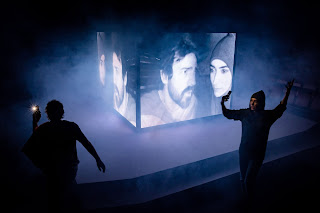Julius Caesar by William Shakespeare.
Directed by Kip Williams. Sydney Theatre Company Wharf 1November
19 – December 23 2021. Bookings. 02 9250 1777 or www.sydneytheatre.com.au
Reviewed by Peter Wilkins
 |
| Julius Caesar at the Wharf Theatre. Sydney Theatre Company Directed by Kip Williams. Photo by Daniel Boud |
“I have never seen a Julius Caesar of such persuasive and thought provoking power” I thought as I sat transfixed by Kip Williams’s incandescent and trailblazing production that thrusts Shakespeare’s political thriller headlong into our present time.
Elizabeth Gadsby’s design instantly
surprises. A large white cube rests on a square white stage surrounded on four
sides by audience in the round. An historical account of Lucius Tarquinius Superbus’s
banishment from Rome in 509BC by Lucius
Junius Brutus, Brutus’s descendant appears on the four sides of the cube. It
gives credence to Marcus Brutus’s opposition to any kingly ambition that might
threaten the democracy of Rome. Williams’s dazzling vision probes with insightful
analysis the nature of motive and relationship that is at the very core of Julius Caesar. For Williams this appears
to be a play, not about a particular time or place but about the universal fear
of vaulting ambition and the loss of individual power. In a production charged with electrifying
energy , the prophetic forces of deed and consequence have never been so acutely felt, as sharp and incisive as
Butus’s knife of betrayal that plunged deep into Caesar’s flesh. As
Shakespeare’s Julius Caesar is a
prophesy for all time, so Williams’s interpretation excites the spirit of his
time, the here and now of political motive, moral corruption and the
relationships that drive the human will.
 |
| Ewen Leslie as Cassius. Zahra Newman as Brutus |
The text is delivered with fiery clarity by the superb and versatile cast of three, who play the key principal characters in the drama as well as occasional minor roles. Geraldine Hakewill is a sinister Casca as well as the devoted Marc Antony, Zahra Newman is the noble Brutus seeking justification for his part in the assassination. Newman also takes on the role of Lepidus, the third member of the opposing triumvirate. Ewen Leslie plays both the lean and hungry Cassius, the persuasive leader of the conspiracy, and an arrogant and obstinate Caesar. Leslie also portrays Carsar’s nephew and successor Octavius as a cocky young corporate executive in his high rise office against a New York backdrop.
 |
| Geraldine Hakewill as Marc Antony. Ewen Leslie as Julius Caesar |
The traversing of Time acts as a stark reminder of history’s prophetic cycle. Williams’s inspiration is Brechtian in intent. Caesar and Brutus’s wives, Calpurnia and Portia, have been cut allowing an audience to judge the meaning of the text as it pertains to Caesar and Brutus, and not the relationship between husband and wife It does not matter whom Caesar addresses when he philosophises “It seems to me most strange that men should fear, seeing that Death, a necessary end, will come when it will come”. Nor does it matter that Marc Antony and Brutus are played by female actors. The text remains true to its meaning, played with intelligence, understanding and conviction by actors, so skilled in their craft that they possess the power and the talent to persuade and convince.
In his obvious intent to
communicate the relevance of Shakespeare’s purpose to a contemporary audience,
director Williams has employed the digital technology of his time to powerful
effect. It is a convention used in a
number of his productions, most notably, The
Picture of Dorian Gray with Eryn Jean Norvill and Brecht’s The Resistible Rise of Arturo Ui with
Hugo Weaving. In Julius Caesar, Williams takes this ingenious innovation to new
heights, providing his actors with smart phones to video each other and the stage
business which is then projected onto the cube.
Brecht and I suspect Shakespeare himself would have heaped high praise
upon this absorbing flight of the director’s imagination.
Every moment of this unerring production surprises from Gadsby’s design to David Bergman’s video design to the bloodstained cloth to represent the slain Caesar to gender swapping and the staging that propels us into the action. To further heighten the relevance of this four hundred and twenty year old political drama, Williams infuses Marc Antony’s speech to the masses with the campaign call of the contemporary politicians. Smartly dressed in a white suit with blood red soled stilettos that she takes out from beneath the blood soaked toga, Hakewill validates the timeless prophesy with a full throttle launch into a bevy of campaign cries echoing the slogans of Churchill, Hanson, Howard, Trump, Morrison, Kennedy and Obama. Yet again Caesar’s assassination in Ancient Rome becomes an omen for all time.
The battle that ensues to right
the bloody deed is not staged with swords and spears, Instead we are confronted
with the artillery and tanks of modern warfare with Pindarus (Hakewill)
appearing as a TV war correspondent in
full protective gear, commenting on the conflict. Every moment of this superb
production is illuminated by fertile and potent imagination.
 |
| Ewen Leslie as Cinna the Poet in STC's Julius Caesar |
Williams’s staging of Julius Caesar pares back all superfluity to direct us with knife edge clarity to the consequence of misguided motive. Upon the scales of life good and evil are delicately balanced and the production comes to an end as Marc Antony slowly places the crown upon his head. That fate befalls the young Octavius in Shakespeare’s play, In the closing moment of his unique production Williams appears to subtly suggest that the same ambition for which Brutus slew Caesar tempts the victor and the vanquished.
Cassius’s prophetic words echo in
my ears as I leave the theatre after this amazing and illuminating
interpretation and re-imagining of Shakespeare’s play. “How many ages hence
shall this our lofty scene be acted o’er in states unborn and accents yet
unknown.” Beware the minds of men.
Williams is Shakespeare’s soothsayer for a new millennium.
All photos by Daniel Boud.
